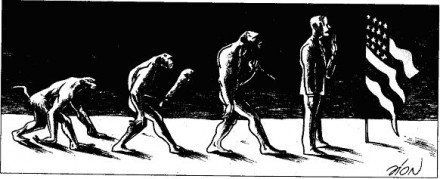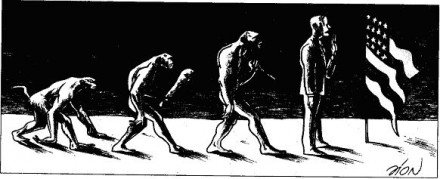


04/01/1995
By Lawrence Chua
Village Voice Literary Supplement, Apr. 1995, p. 17.

ALIEN NATION: Common Sense About America’s Immigration Disaster By Peter Brimelow Random House, $23
Every nation needs its barbarians. In Alien Nation, Peter Brimelow bestows this title on the motley crew of darkies now banging on America’s gates. Like his son’s diapers (dwelt upon in an opening anecdote), Brimelow’s book on the horrors of immigration is a caustic package with few real surprises. British-born, Brimelow recently became a U.S. citizen, a privilege few of the African, Asian, and Latino immigrants he dreads can ever hope to attain. Nonetheless, Brimelow echoes the paranoid assertions of Ronald Reagan circa 1983: the United States has lost control of its borders, and stands to lose its identity as well.
"A series of institutional accidents," he writes, "of which birthright citizenship is just one, has essentially robbed Americans of the power to determine who, and how many, can enter their national family, make claims on it … and exert power over it."
That power, for Brimelow, is the bottom line. Because once too many darkies tip the scales, the racial privilege this country was founded on will end. White people must control the national family or America will cease to exist. "As late as 1950, somewhere up to nine out often Americans looked like me," he writes. "That is, they were of European stock. And in those days, they had another name for this thing dismissed so contemptuously as 'the racial hegemony of white Americans.' They called it 'America.'"
If one were to receive Brimelow’s thoughts in a bar as he teeters between illumination and unconsciousness, the problems involved would be small. Yet here Random House is offering those thoughts between hard covers, giving the impression to innocent book buyers that they might be something more than incoherent attempts at naturalizing race and affirming white supremacy. The passage of Proposition 187 in California, the torching of mosques on both coasts, the vicious attacks on women’s reproductive rights, and the stepped-up paramilitary policy of imprisoning indigents and the poor — as well as the publication and respectful consideration of The Bell Curve, Dictatorship of Virtue, and so on — do not augur well for a progressive, or even moderately liveable, United States. That a commercial house should feel comfortable publishing a reactionary ramble like this speaks to the ideological climate in which we are living.
Alien Nation is presented physically as if it involved considerable research. Brimelow’s arguments are trim, punctuated with bullets and indented quotes, lending the book the appearance of easy reading informed by careful reporting. On inspection, Brimelow’s reasoning is wildly convoluted and riddled with historical inaccuracies. (He writes, for example, that the North American continent at the time of the revolution was "biracial, not multiracial.") The bulleted items are almost exclusively quotes from the wisdom of … Peter Brimelow. He references Thomas Paine almost as frequently, to no particular effect except that Paine seems to have proprietary rights to the term "common sense" and Brimelow is confident that his own sense is common. Common sense, we learn, is "the antidote to myth." By means of this and similarly sophisticated oppositions-good versus bad, native versus immigrant, truth versus falsehood-Brimelow constructs what from time to time has the texture of argument.
His position falls within the binary framework that increasingly accompanies discussions of immigration in the commercial media. A recent anthology on the subject bore the subtitle "A Wealth of Diversity or a Crushing Burden?" In other words, are the wogs here to roll an honest burrito or to blow up the World Trade Center? Brimelow never gets beyond this kind of dualism. The only oppositional argument he can imagine to his platform is that "We need immigrants to do the dirty work that Americans won’t do." His solution: set dogs on the U.S.-Mexico border to spook the darkies; round up the wetbacks and send them "home"; end education efforts that promote diversity and non-English-language retention; and only permit bachelor immigration by "skilled" laborers.
To some extent, Brimelow stakes his argument in moral territories. In a chapter titled "The Morality of Immigration," he quotes the Bible in support of xenophobia and reveals that a 1992 Gallup Poll found "self-reported Christians, Catholics and Protestants alike were not only heavily opposed to current mass immigration-but were actually more opposed than those respondents who professed no religion." This is meant to indicate that even especially moral people-those who profess Christianity-oppose immigration. Q.E.D. His morality does not, however, acknowledge how Americans — five per cent of the world’s population — feast on half the planet’s resources.
Elsewhere Brimelow, a financial writer by trade, focuses on economics. He correctly notes that within "the Third World, an immense migration to the cities is underway. And that’s usually the first step that leads to emigration." He quickly drops this line of inquiry, because to explore the interdependence of economic and social systems in the context of immigration would have forced him into something other than simpleminded ranting-and that is a step he is justifiably reluctant to take. His preferred heuristic device, which he deploys with an ease that can only come from practice, is the underfed non sequitur: "When you think about it, the emergence of the nation-state on the world scene is very much like the simultaneous emergence of the firm in developing capitalist economies. Both can be traced to lower transaction costs, efficiencies in the transmission of information and the superior economies of specialization." But hasn’t specialization contributed to the transnationalization of capital?
Even Brimelow won’t argue that immigration is a financial burden. He acknowledges immigrants' payments into the Social Security system. Yet he fears that immigrants may one day make a claim on the system they've helped fund. "Americans have created a system that produces wealth. They can only share wealth to the extent that sharing it does not impair the system." Several things occur in these two sentences: (1) "Americans" evidently cannot include Third World immigrants, despite (2) the admitted fact that immigrants contribute to the (American) economy. This is necessary, if irrational, because we need to arrive at (3): "Americans" have to feel justified in not "sharing" what has become, between the lines, theirs to dispense. It’s as if American wealth just spontaneously arose one day. The global proletariat that has fueled and continues to fuel the American economy, and that has never shared in its wealth, remains invisible. Which is, of course, the point.
Despite his admiration for white America as the real America, Brimelow doesn’t hesitate to emphasize the threat immigration represents to African Americans. Whatever impact immigration has, he believes, it first affects unskilled workers, "and in the United States, that means blacks." The very real tensions between communities of immigrant and native-born colored folk have underscored the complex ways class, language, and gender get played out and against one another in the U.S. But Brimelow isn’t capable of honestly discussing, among other things, the ways his own privilege is reinforced by those divisions.
Essentially, he is less concerned with the actual movement of people across borders than with what kind of people are moving. Comparing current immigration policy with his experience of living in New York, he writes: "Just as when you leave Park Avenue and descend into the subway, when you enter the INS waiting rooms you find yourself in an underworld that is not just teeming but is also almost entirely colored. … You have to be totally incurious not to wonder: where do all these people get off and come to the surface?"
Brimelow’s fear is that they will get off at Park Avenue and rob him. Or worse. Free associating, Brimelow points to Colin Ferguson and the defendants in the World Trade Center bombing trials as examples of why immigration needs to be cut back. With dramatic clairvoyance, given that not all the trials have ended, he writes: "[I]f Ferguson and the others had not immigrated, those fourteen Americans would not have been killed." In Brimelow’s world, racial and ethnic difference can only lead to violence and strife-unless they are managed by a white core, the Real Americans. "[C]ultural differences result in incomprehension and sometimes in serious conflict. Which is why the nation-state, where everyone understands one another, is an efficient way of organizing human beings." Sounds simple enough. One people, one nation, one language, one father. Brimelow’s from another of the nervous-parent passages that give Alien Nation a certain lurid, obsessive vitality. People in general, he explains, like war: "They will always find an excuse for it. (My little son jumped, then wheeled to look at me, his face alight with joy, when he first heard firecrackers reverberating through the Manhattan canyons in the week before July Fourth. He was not yet two. But the frenzy to enlist at the outbreak of war in the Britain of 1914, in the North and South of 1861, was all there.)"
There are bright spots. Some Asian immigrant groups, he writes (careful to exempt Southeast Asians), have become economically successful. "They even vote more like the American majority than do other ethnic minorities." And Latinos are assimilating fast. "The ultimate symptom of assimilation is intermarriage," he writes, deviating from his insistence on racial purity. The deviation doesn’t last long, for even among the intermarried bad apples do appear. He points to a Latino critic of his work, one of whose parents is Anglo to illustrate that "intermarriage cannot guarantee social harmony. That can be done only by an American majority that is confident and strong." Brimelow’s argument does underscore the limitations of multiculturalism and Benetton hand-holding, which cannot be more than marketing strategies as long as white supremacy remains in full effect.
Publishing books like this is one way the publishing industry insures its own demise. Rather than trying to build literacy and expand the American mind, the commercial publishing industry hands out contracts to any psychotic with a National Review byline. While we see so much progress in publishing radical theoretical and literary work, it has this bizarre accompaniment: I expect Random House plans to be admired for its courage in publishing a manual for fascism, just as the Free Press has received praise for releasing The Bell Curve. Newt Gingrich’s historian had to go because she wanted fair time for the Nazi point of view. She should have written on immigration instead. In the current climate, freedom of expression for the white supremacist point of view, especially if allusion is made to economic "security interests," seems assured.
We might dismiss the rantings of Peter Brimelow as delusional paranoia. But the truth is, it’s more of a desperate gasp. As multinational development schemes like NAFTA and GATT continue to degrade the quality of Third World life, more and more people are being displaced. We take our acts across oceans in order to survive. Our survival depends on the destruction of the privilege Brimelow is so desperate to defend. His fear is justified. We will bury him.